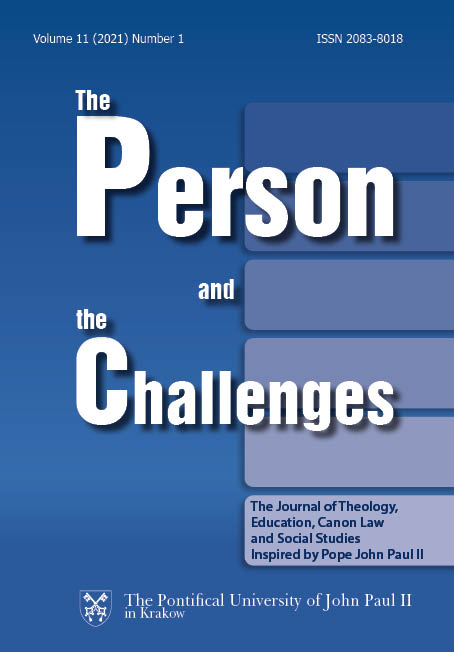An axiological approach to the problem of sexual education
DOI:
https://doi.org/10.15633/pch.3892Słowa kluczowe:
Human freedom, love, sexuality, John Paul II, WHO “Standards for Sexuality Education in Europa”Abstrakt
Among all sorts of technological and cultural breakthroughs affecting our civilisation which we have witnessed over the last few decades, the changes regarding the most intimate spheres of human nature, those of sexuality, may have passed unnoticed. A series of changes in social norms triggered after 1968 resulted in a situation which, as far as sexuality is concerned, can be described as a real „controversy over human existence”.
This paper will briefly outline some of the characteristics of the social changes that have occurred over the past fifty years and which have had a significant impact on the understanding of the nature of sexuality. Then, two apparently competing visions of man, the traditional and the modernist will be compared. As far as the traditional concept is concerned, reference will be made to the teachings of John Paul II. The modernist approach will be illustrated based on the „Standards for Sexuality Education in Europa” formulated by the World Health Organisation. The objective is not to settle the dispute, but to try and highlight its substance as well as the consequences arising from adopting one or the other of the proposed approaches.
Bibliografia
Benedict XVI, Deus Caritas Est, http://www.vatican.va/content/benedict-xvi/en/encyclicals/documents/hf_ben-xvi_enc_20051225_deus-caritas-est.html (3.11.2020).
Catechism of the Catholic Church, https://www.vatican.va/archive/ENG0015/_INDEX.HTM (3.11.2020).
Congregation for Catholic Education, Male and female he created them (2.02.2019), https://www.newwaysministry.org/wp-content/uploads/2019/06/Male-and-Female-Document-June-10-2019.pdf
Kohler PK., Manhart LE., Lafferty WE., Abstinence-only and comprehensive sex education and the initiation of sexual activity and teen pregnancy, “Journal of Adolescent Health” (2008).
Sacred Congregation For Catholic Education, Educational Guidance in Human Love Outlines for Sex Education (1.11.1983), https://www.google.com/search?q=Sacred+Congregation+For+Catholic+Education.+Educational+Guidance+In+Human+Love+Outlines+for+sex+education&rlz=1C1TEUA_plPL583PL583&oq=Sacred+Congregation+For+Catholic+Education.+Educational+Guidance+In+Human+Love+Outlines+for+sex+education&aqs=chrome..69i57.1755j0j15&sourceid=chrome&ie=UTF-8
Standards for sexual education in Europe, https://www.bzgawhocc.de/fileadmin/user_upload/WHO_BZgA_Standards_English.pdf (3.11.2020).
The Pontifical Council For The Family, The Truth And Meaning Of Human Sexuality. Guidelines For Education Within The Family (8.12.1995), http://www.vatican.va/roman_curia/pontifical_councils/family/documents/rc_pc_family_doc_08121995_human-sexuality_en.html
Tischner J., Spór o istnienie świata, Kraków 1998.
WHO Document, https://www.who.int/reproductivehealth/topics/sexual_health/sh_definitions/en/ (3.11.2020)
Wojtyła K., Love and Responsibility, trans. G. Ignatik, Boston 2013.
Wojtyła K., The Acting Person, Springer 1979.
Pobrania
Opublikowane
Numer
Dział
Licencja
Autorzy publikujący w czasopiśmie udzielają jego wydawcy zgody o następującej treści:
- Autor zachowuje autorskie prawa majątkowe do utworu, a jednocześnie udziela wydawcy czasopisma zgody na jego pierwszą publikację w wersji drukowanej i wersji online na licencji Creative Commons Uznanie autorstwa 4.0 Międzynarodowe oraz zgody na wykonywanie opracowań, w tym przekładów.
- Autor ma możliwość udzielania zgody niewyłącznej na opublikowanie utworu w wersji, która ukazała się w czasopiśmie (np. zamieszczenia go w repozytorium instytucjonalnym lub opublikowania w książce), wraz z informacją o jego pierwszej publikacji w czasopiśmie.
- Autor może umieścić swój utwór online (np. w repozytorium instytucjonalnym lub na swojej stronie internetowej) jeszcze przed zgłoszeniem utworu do czasopisma.

